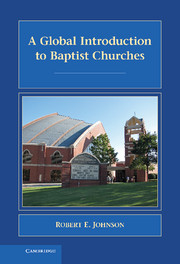Book contents
- Frontmatter
- Contents
- List of Illustrations
- Acknowledgments
- List of Important Baptist Organizations
- Global Baptist Timeline
- Introduction
- PART I FOUNDATIONS
- PART II AGE OF EMERGING BAPTIST DENOMINATIONAL TRADITIONS
- PART III THE FRONTIER AGE
- PART IV AGE OF PROLIFERATING TRADITIONING SOURCES
- 6 Baptists' Evolving Traditioning Sources in Africa, Asia, and Oceania
- 7 Baptists' Evolving Traditioning Sources in Latin America, the Caribbean, Europe, and Eurasia
- 8 Baptists' Evolving Traditioning Sources in North America
- PART V BELIEFS AND PRACTICES
- Index
- References
6 - Baptists' Evolving Traditioning Sources in Africa, Asia, and Oceania
Published online by Cambridge University Press: 05 September 2012
- Frontmatter
- Contents
- List of Illustrations
- Acknowledgments
- List of Important Baptist Organizations
- Global Baptist Timeline
- Introduction
- PART I FOUNDATIONS
- PART II AGE OF EMERGING BAPTIST DENOMINATIONAL TRADITIONS
- PART III THE FRONTIER AGE
- PART IV AGE OF PROLIFERATING TRADITIONING SOURCES
- 6 Baptists' Evolving Traditioning Sources in Africa, Asia, and Oceania
- 7 Baptists' Evolving Traditioning Sources in Latin America, the Caribbean, Europe, and Eurasia
- 8 Baptists' Evolving Traditioning Sources in North America
- PART V BELIEFS AND PRACTICES
- Index
- References
Summary
In general, Baptists were not prepared adequately to handle the array of alternate perspectives thrust on them over the course of the twentieth century. The major medical, technological, political, social, and scientific advancements of the twentieth century offered ideational possibilities Baptist theological frameworks were not proficient to negotiate. Changes in those fields radically transformed the ways much of humanity lived and perceived its world, producing ethical, theological, and organizational issues that many Baptists individually and corporately were not equipped to face. As the century progressed, clear differences appeared in the priority rankings given by distinct Baptist traditions to the varied matters of local and global concern. Those variations reflect obvious ethnic, income, social class, and regional discrepancies and suggest that a complex set of traditioning sources were at work within the Baptist movement, many of which had been concealed by the prevalent ways of conceptualizing Baptist identity.
Among the major topics of contention addressed by Anglo-American Baptists were evolution, biblical critical studies, feminism, the civil rights movement, faith and politics, sexual orientation, and medical research (such as cloning and stem cell). In general, such issues focused on ideological and technological shifts that threatened prevailing Anglo-American Baptist worldviews. African American Baptist struggles were more focused on questions of how to approach justice issues such as civil rights, housing discrimination, educational inequities, and health-care costs. Issues raised by technology did not seem as important as liberationist-oriented theological concerns. British Baptists wrestled with a growing secularism that was augmented by the horrors of two world wars, seriously declining membership, and identity issues over what it should mean to be Baptist in a society that increasingly questioned the relevance of religious faith altogether. Russian Baptists had major divisions over whether a Christian should cooperate with a communist government by obeying laws regulating religious activity. Baptist women in various contexts tended to express more concern related to the theological issues surrounding equal opportunities in education and employment, family matters, and gender insensitivity in Baptist life. In Latin America, Africa, and Asia, Baptists seldom divided over the issues about which Anglo-Americans fought. This indicates something about the lack of relevance of those concerns in other cultural contexts. Anglo and Anglo-American Baptist theological divisions frequently were imported via missionaries into those contexts, especially through competing mission organizations created expressly as a consequence of differences back home.
- Type
- Chapter
- Information
- A Global Introduction to Baptist Churches , pp. 234 - 284Publisher: Cambridge University PressPrint publication year: 2010

